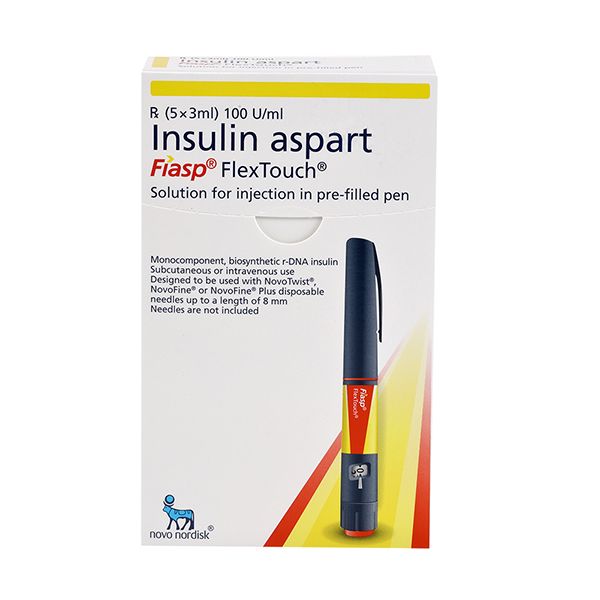
Type:3ml
Generic Name:Insulin Aspart
Manufacturer:Novo Nordisk
Price:৳949.40
Diabetes mellitus
SC injection Should be taken with food. Administer immediately within 5-10 minutes before a meal. When administered by SC injection, insulin aspart should generally be used in regimens with an intermediate- or long-acting insulin Administer subcutaneously in the upper arm, thigh or abdominal wall. A subcutaneous injection into the abdominal wall results in a faster absorption than from other injection sites. Injection sites should be rotated within the same region to reduce the risk of lipodystrophy
Subcutaneous Type 1 Diabetes Mellitus Improvement of glycemic control in adults and children with diabetes mellitus May administer 0.2-0.6 unit/kg/day in divided doses; conservative doses of 0.2-0.4 unit/kg/day often recommended to reduce risk of hypoglycemia Total maintenance daily insulin requirement may vary; it is usually between 0.5 and 1 unit/kg/day; nonobese may require 0.4-0.6 unit/kg/day; obese may require 0.6-1.2 units/kg/day Type 2 Diabetes Mellitus Diabetes inadequately controlled by diet, weight reduction, exercise, or oral medication Initial: 0.2-0.4 units/kg/day SC divided q8hr-q12hr. And an intermediate (eg, NPH) or long-acting insulin at bedtime recommended; Hepatic impairment: Dosage reduction may be needed. Dosing Considerations When used in a meal-related SC injection treatment regimen, 50-75% of total insulin requirements may be provided by an intermediate-acting or long-acting insulin; the remainder is divided and provided before or at mealtimes as a rapid-acting insulin, such as insulin aspart Dosage must be individualized; blood and urine glucose monitoring is essential in all patients receiving insulin therapy
Subcutaneous Type 1 Diabetes Mellitus Improvement of glycemic control in adults and children with diabetes mellitus >2 years: May require 0.8-1.2 units/kg/day SC during growth spurts; adolescents may require <1.2 units/kg/day; otherwise, may use 0.5-1 unit/kg/day
Renal impairment: Dose adjustments may be needed.
Hypoglycaemia. Hypersensitivity to any of the components.
Insulin aspart, a rapid-acting analog of human insulin, lowers blood glucose levels; it regulates carbohydrate, protein and fat metabolism by inhibiting hepatic glucose production and lipolysis, and enhancing peripheral glucose disposal.
Pregnancy (insulin requirements tend to fall during the 1st trimester, increase during the 2nd and 3rd) and lactation. Caution with decreased insulin requirements: Diarrhea, nausea/vomiting, malabsorption, hypothyroidism, renal impairment, hepatic impairment Hypokalemia may occur Use with caution in renal and hepatic impairment (dosage requirements may be reduced) Caution with increased insulin requirements: Fever, hyperthyroidism, trauma, infection, surgery Lactation: Safe to use while breastfeeding
Allergic reactions. Injection site reaction, lipodystrophy, pruritus, rash, lipoatrophy, hypokalaemia, blurred vision. Hypoglycaemia, insulin resistance.
Effects may be increased by: oral antidiabetic agents, ACE inhibitors, disopyramide, fibrates, fluoxetine, MAOIs, propoxyphene, salicylates, somatostatin analog (e.g., octreotide), sulfonamide antibiotics. Effects may be decreased by: corticosteroids, niacin, danazol, diuretics, sympathomimetic agents, isoniazid, phenothiazine derivatives, somatropin, thyroid hormones, oral contraceptives, lithium. Signs of hypoglycaemia may be masked by beta-blockers, clonidine.